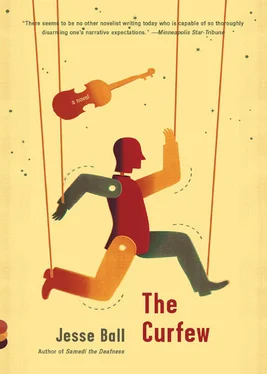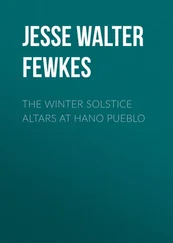He ducked behind a tree. Two men, this time with flashlights. These were dressed in a military fashion. Some sort of night guard, and the only one who sees them is taken away. If he was in the situation, as Gerard had said, this situation that you are brought to by chance, would he be brave enough to act? Many things had suddenly made sense. All the recent trouble — it was due to an idea. A clean, clear idea. He had searched for such ideas, once, he and Louisa.
They were gone now. He came out from behind the tree and hurried on. It was a cold night. Against the houses ahead, he could see that the fire was still burning — had it been a police station?
Now, the last of it: he had to cross a broad stretch of pavement to get to his quarter. He broke into a run. It seemed a great distance he had to cover. It stretched away from him as he ran. He ran faster and it was farther.
— Hey, you! You!
William ran. He wanted to drop the violin, but it was useless. They would find it even if he dropped it, and he mustn’t drop it. Yet more precious were the documents, and those would consign him to death regardless. He could not let them go, no matter what it meant.
Cries went up behind him. There were three, no, four of them. They were gaining. The black ground sped past him. Lights whirred in the distance.
— There he is.
They were on either side. He ran into the park, and down a path. The dim, glowing bulbs of the park seemed to multiply shadows. He might do it. He might get away. Then, onto uneven ground, a moment, a moment, and then his feet were out from under him. The violin case was lost, it, too, was in the air, and then he hit the ground. The papers were gone. A second later and a body crashed into him, pinning him. Where had the papers gone? He struggled to get free.
— He’s here. I’ve got him. Here.
Rough hands were on him, and a great deal of weight. William lay, lungs heaving, face cut from the fall. He could not even see the people who had caught him. This was the sort of war they were in.
— I must get home. My daughter. I, I fell asleep. I didn’t realize what time it was. I was working late.
There was no response.
He said it again,
— I must get home. I have a child.
— No one is out now who doesn’t mean to be.
It was an awful voice. It gave nothing beyond itself.
— I, I beg you.
William tried to turn off his stomach, but the man pressed down harder. He could hardly breathe.
— The others will be here soon.
The hands that bent his own arm down into his back must belong to that voice, but for all that he knew, it could have come from anywhere. There was a creaking high up in the branches of the trees, and it would continue through the long night. It meant nothing, just that the wind was blowing. The action of a thing is the same as the naming of it — is, in fact, the real name. The trees creak and they are saying, trees creak through the long night . The long night — what is it? Trees creaking. There wasn’t anything that tied life’s moments together, except life. And when it was gone?

They were finishing their painting of the figures. They had been hours at it, or mostly Mr. Gibbons, who was an expert, and could fix a figure at a moment’s notice and with no effort whatsoever. Meanwhile, Molly wrote the dialogue, the scenes, and slipped them back and forth for Mr. Gibbons’s approval. They were doing it backwards as he had said, backwards, except for the final scene. It was the compromise they had reached.
There was a mouse whose face had been given the features of Molly, a mouse dressed in a yellow slip.
There was a man and he had been cleverly painted. He really did look like William, and Molly said as much.
Two bird-puppets bore an uncanny resemblance to Mr. and Mrs. Gibbons.
A wolf with a crown had been Molly’s final, and most difficult, choice. She had run back to her apartment to fetch a photograph from her father’s desk. Now it was a she-wolf, in a long dress, and it looked like Molly’s mother.
*I don’t remember her very well.
— That’s all right. You remember who she was, and your father has spoken of her.
*He told me all about her.
— I know he has.
And so the work continued.
— The motion of the puppets, Mr. Gibbons explained, is too complicated to teach now. You will have to be satisfied with my doing it. After all, you wrote it all down, everything, and I understand it well. I have the voices as they are, and for the Molly-marionette, we have the boards.
There were boards on which was written each portion of the dialogue of Molly’s puppet. They would slide out at the appropriate time.
Molly had been so caught up in the preparations for the play that she was astonished to find, when she turned around, that many of the seats of the theater were now full. Mrs. Gibbons had placed life-size puppets of various kinds throughout.
— Every theater, said Mr. Gibbons, must have an audience, no matter how small.
The lights dimmed.
— Seats, everyone.
Molly sat in the front. The theater rose up before her and engaged her entire field of view. A fine curtain hung across it. Gilt edges ran the length through the poised air. The wood was painted in expectation of certain delight, and that very delight and longing ran all through her as though she believed that answers might be found. If her father would return soon, it might well be through the agency of puppets as well as anything. It might certainly. Might it not?
— Seats!
Mrs. Gibbons settled herself in the back row.
— A LADDER OF RAIN AND THE ROOF BEYOND, a play by Molly Drysdale (mostly) and Siegfried Gibbons (hardly).
Molly’s hand was signing something beneath the chair, but it could not be observed.
It was now early in the morning and William still had not returned.
A LADDER OF RAIN AND THE ROOF BEYOND
A horse rides in on a horse’s back. It is dressed as a colonial soldier. The movements of the horse are exactly like those of a horse.
— Those who know me not, know this, said the horse: there are things that must be said, and this is how we say them: without regard to safety, and saving nothing for last. Else the fire cannot last the night.
The horse rides away.
A voice says:
Louisa is approaching a small window that has been cut into a wall. She looks back. She appears to be sneaking. Her life has been so far a happy one. Educated at the best schools, given the best things, taken to the best restaurants. Journeyed abroad. An owner of horses. Taken up in airplanes. Rail travel. Widely read. She felt as many well-brought-up people do that her life is a collection, that she is always collecting. She is also very brave and although rather weak, objectively, is physically tough by virtue of a fierce will. She had once cut herself in a shop while looking at hunting knives. Instead of saying anything, she just put her hand in her pocket. Halfway home someone made her take it out and found that it was covered in blood. Her pocket was soaked. Rather than hurt, she was just embarrassed.
Louisa approaches the window. It is really very small. She looks through the window. It is not the sort of window that divides indoors from outdoors, but rather that more secretive sort of window which privileges one room over another. Into a grand auditorium she peers. A figure is on the stage. Over her shoulder, we can just see through the window the vastness of the room beyond.
CURTAIN
A grand auditorium. William stands, not on one foot, not on two. His feet appear to be bearing his weight, but it isn’t true. In fact, all his attention is on the violin in his hands, which he is about to play. He looks up at a small window cut into the back corner of the room. Someone in the back of the audience is whispering, and this is what they say:
Читать дальше













